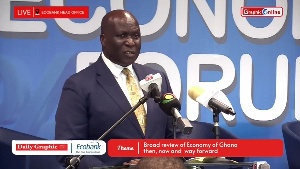Business News of Wednesday, 28 May 2025
Source: www.ghanawebbers.com
Ghana’s economic rebound real, but reforms must continue – Bank of Ghana
The Ghanaian economy is showing signs of recovery. However, sustaining this progress requires consistent policy execution and deep structural reforms. Collective national resolve is also essential.
Mr. Osei Gyasi from the Bank of Ghana shared these insights today at the Daily Graphic/Ecobank Ghana Economic Forum in Accra.
He noted that the economy is rebounding from past crises and vulnerabilities. This recovery is supported by tight monetary policy and improved external sector performance. Ongoing reforms under the International Monetary Fund programme are also contributing to this positive trend.
Mr. Gyasi praised the forum's organizers for fostering open discussions about the economy. He encouraged participants to use this platform to create a roadmap for economic renewal.
In 2025, signs of recovery are becoming clearer. The cedi has appreciated after a 19.2 percent depreciation in 2024. Inflation has decreased significantly, from 23.8 percent in December 2024 to 21.2 percent in April 2025.
This improvement is due to currency stability, tight monetary policy, and better supply-side conditions. The external sector has also shown marked improvement, with a strong current account surplus driven by gold and cocoa exports.
Ghana’s gross international reserves reached $10 billion at the end of April—an all-time high—covering 4.7 months of imports. The country achieved real GDP growth of 5.7 percent in 2024, exceeding expectations, with a projected growth of four percent in 2025.
These developments have renewed investor confidence, leading to an upgrade in Ghana’s credit rating by S&P from ‘selective default’ to ‘CCC+’.
However, Mr. Gyasi warned that this progress remains fragile. Fiscal pressures, currency volatility, and global economic challenges pose significant risks ahead.
He emphasized the need for close coordination between monetary and fiscal authorities to avoid reversing gains made so far.
During its May meeting, the Bank of Ghana’s Monetary Policy Committee decided unanimously to maintain the policy rate at 28 percent. This decision aims to consolidate gains made in reducing inflation.
Mr. Gyasi announced a structural reform requiring banks to hold reserves in their respective deposit currencies for better liquidity management and effective monetary policy transmission.
He acknowledged ongoing concerns about asset quality within the banking sector. The non-performing loan ratio stands at 23.6 percent but drops to nine percent when adjusted for provisions.
This indicates that banks are actively working on improving their loan books while remaining strong and well-capitalized with a capital adequacy ratio of 15.8 percent as of April 2025—well above the regulatory minimum of ten percent.
Looking ahead, Mr. Gyasi argued that macroeconomic stability alone cannot reset Ghana’s economy fully. A broader growth model beyond gold and cocoa reliance is necessary.
He urged greater investment in value addition and diversification into sectors like agro-processing, light manufacturing, logistics, tourism, education, and health.
These sectors have high potential for job creation and export expansion but require targeted policy support and infrastructure investment.
Mr. Gyasi highlighted structural challenges such as limited domestic revenue mobilization and weak public financial management systems that need addressing for economic transformation.
According to him, Ghana's success will depend on sound policies combined with consistency and commitment to transparency and rule of law.
In conclusion, Mr. Gyasi acknowledged that challenges lie ahead but emphasized courage and collective effort can achieve a stable Ghanaian economy competitive globally.
He reaffirmed the Bank of Ghana’s commitment to prudent policy implementation while encouraging participants to make this forum a catalyst for national economic renewal.
The forum took place at Ecobank Head Office under the theme “A broad review of the economy of Ghana: Then, now, and the way forward.” It featured remarks from Presidential Advisor Seth Terkper and PwC Ghana’s Tax Partner Abeku Gyan-Quansah as participants discussed monetary policy issues focused on long-term growth strategies.











